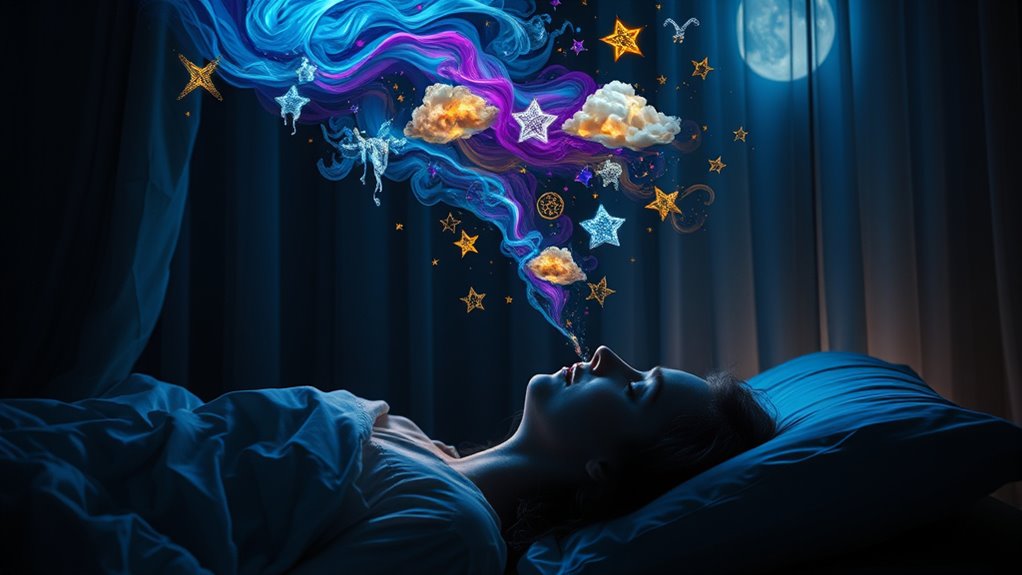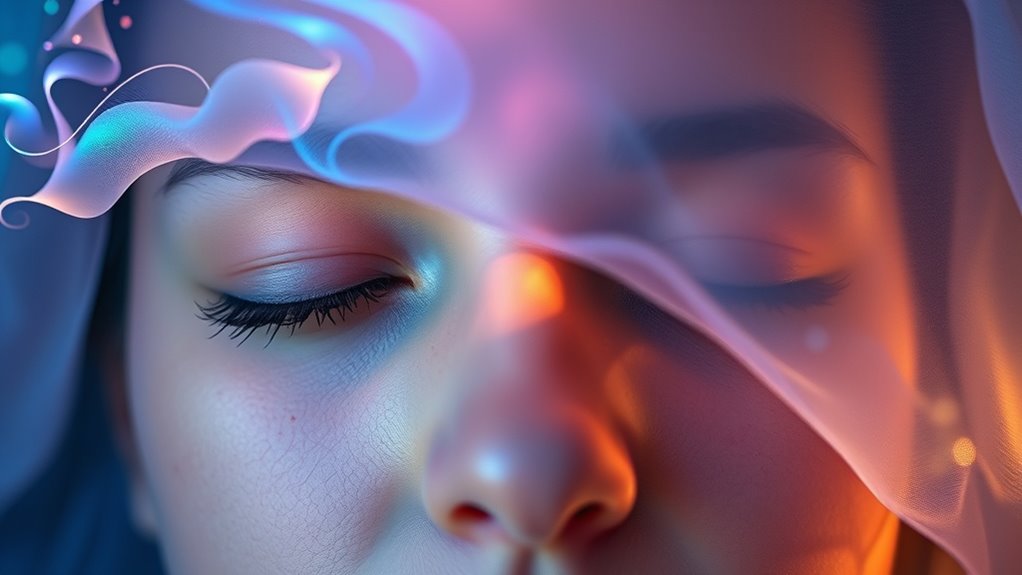Dreams happen during REM sleep when your brain is very active, even though your body remains still. They serve many purposes, like helping you process emotions, strengthen memories, and work through daily experiences. Some dreams reflect your subconscious thoughts, symbols, or desires, while others may be random. Lucid dreaming shows you can even control aspects of your dreams. To uncover more about why you dream, explore how these nightly stories reveal hidden parts of yourself.
Key Takeaways
- Dreams help process daily experiences and manage emotional stress.
- They assist in consolidating memories and mental rehearsal.
- Dream symbolism reveals subconscious thoughts, desires, and unresolved conflicts.
- Lucid dreaming demonstrates self-awareness persists during sleep, enabling conscious exploration.
- Dreams serve to promote emotional regulation and support personal growth.

Have you ever wondered why we dream? It’s a question that has puzzled humans for centuries, and modern science still searches for definitive answers. Dreams occur during the REM stage of sleep, when your brain is highly active, yet your body remains mostly still. While some believe dreams are just random images, others think they carry deeper meaning through concepts like dream symbolism. One fascinating aspect of dreaming is lucid dreaming, where you become aware that you’re dreaming and may even control what happens next. This phenomenon suggests that our minds are capable of self-awareness even in sleep, blurring the line between waking and dreaming states.
Lucid dreaming offers a unique window into understanding why we dream. When you realize you’re dreaming, you can actively engage with the dream world, explore your subconscious, or confront fears in a safe, controlled environment. This control indicates that dreams are not just passive experiences but can serve as a kind of mental rehearsal or processing tool. Many lucid dreamers use their awareness to solve problems or practice skills, implying that dreams help us prepare for real-life challenges. This active participation shows that dreams aren’t merely random images but have purpose, possibly in consolidating memories or emotional regulation.
Dream symbolism also plays a significant role in understanding why we dream. Throughout history, cultures and psychologists have interpreted dreams as messages from the subconscious. For example, dreaming of water might symbolize emotions or the flow of life, while flying could represent freedom or a desire to escape constraints. Recognizing these symbols helps you decode your inner thoughts, fears, and desires. When you start paying attention to recurring symbols or themes in your dreams, you gain insight into your subconscious mind. This process of interpretation can be enlightening, revealing unresolved conflicts or aspirations that you might not be consciously aware of during waking life.
Ultimately, dreams may serve multiple functions. They allow your mind to process daily experiences, manage emotional stress, and explore your inner world through symbolism. Research in sleep science indicates that the contrast ratio of a projector significantly impacts the perceived depth and clarity of images, which can be metaphorically related to how contrast in dreams enhances the vividness of our mental imagery. With lucid dreaming, you gain a level of awareness that reveals dreams as more than just random images; they are a reflection of your subconscious, a space for exploration and understanding. By paying attention to dream symbolism and practicing lucid dreaming, you can deepen your connection with your inner self. This awareness might make your dreams not just mysterious nighttime stories but valuable tools for personal growth and self-discovery.
Frequently Asked Questions
Do Animals Dream Like Humans?
You might wonder if animals dream like humans, and evidence suggests they do. Based on animal cognition and sleep behavior, many animals, especially mammals and some birds, experience REM sleep, during which dreaming occurs. You can observe their twitching, rapid eye movements, or vocalizations that indicate they might be dreaming. So, yes, animals probably have dreams, reflecting their experiences and cognitive processes just like you do.
Can Dreaming Predict the Future?
Think of your dreams like a weather forecast from your subconscious messages—they might hint at future events, but they don’t predict them with certainty. Dream symbolism often reflects your emotions or unresolved issues, guiding you to insight. For example, dreaming of a storm could symbolize turmoil ahead, but it’s not a guarantee. You can interpret dreams as valuable clues, not precise predictions, helping you prepare mentally for what’s coming.
Why Do Some People Remember Dreams Better?
You remember dreams better because you practice dream recall techniques like keeping a dream journal or setting intentions before sleep. If you try lucid dreaming, you often become more aware during dreams, which improves recall. Consistently focusing on your dreams and practicing these techniques strengthens your memory of them. Your brain becomes better at capturing details, so with effort, you can remember dreams more vividly and frequently.
Do Nightmares Have Specific Meanings?
Nightmares often carry specific meanings, with about 85% of adults experiencing them at some point. These frightening dreams can be linked to unresolved fears or stress. In dream symbolism, nightmares might represent anxiety or warning signs from your subconscious. Nightmare interpretation helps you understand hidden emotions, so paying attention to recurring themes can reveal what your mind is trying to process, ultimately offering insight into your waking life.
Can Dreams Be Used to Solve Problems?
You can use dreams for problem solving through dream analysis, which helps you understand hidden thoughts and emotions. While you sleep, your mind makes connections and explores solutions you might not see consciously. Keep a dream journal to record your dreams; over time, you may notice patterns or insights that guide you toward answers. Dreams often reveal creative ideas or new perspectives, making them a valuable tool for solving personal or professional challenges.
Conclusion
So, next time you find yourself chasing flying tacos or arguing with your boss as a giant banana, remember—your dreams are just your brain’s way of hosting a wild, unpredictable party. Who needs reality when you’ve got a nightly circus of nonsense? Sleep tight, and don’t forget to thank your subconscious for the free entertainment—because in the world of dreams, logic takes a vacation, and chaos rules the night.









